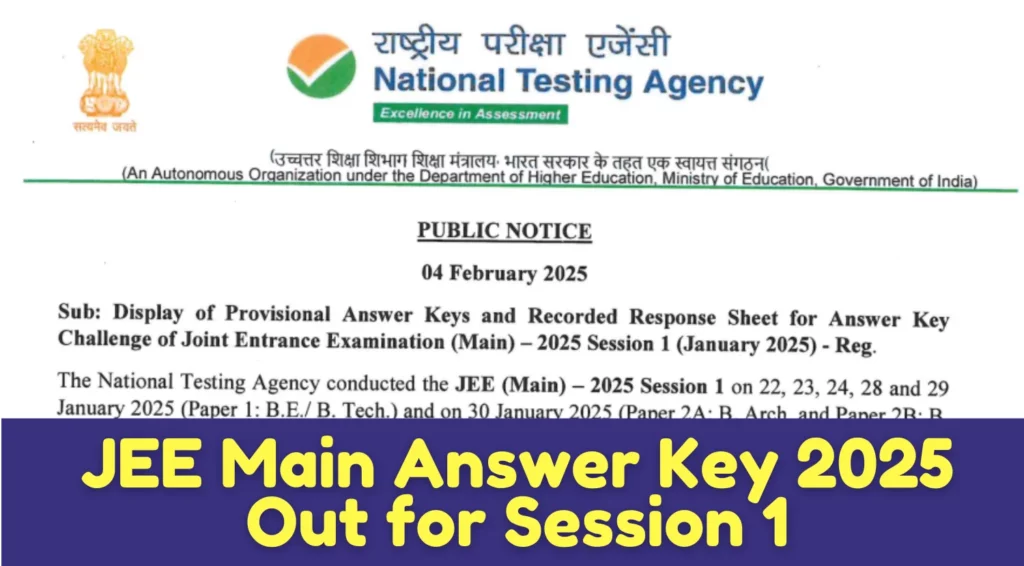The Joint Entrance Examination (JEE) Main 2025 Session 1 has successfully concluded, marking a significant milestone for aspiring engineers across India. As the gateway to prestigious institutions like the National Institutes of Technology (NITs) and a qualifying exam for JEE Advanced, the stakes are undeniably high. With the National Testing Agency (NTA) releasing the provisional answer key, candidates are now keen to assess their performance and gain insights into the examination’s intricacies.
This structured schedule ensured a smooth examination process across various centers nationwide.
Release of Provisional Answer Key
On February 4, 2025, the NTA released the provisional answer key for JEE Main 2025 Session 1. Candidates can access the answer key by visiting the official website: jeemain.nta.nic.in. The provisional answer key allows candidates to compare their responses and estimate their probable scores before the official results are declared.
Challenging the Answer Key
The NTA has provided an opportunity for candidates to challenge the provisional answer key if they find discrepancies. To do so, candidates should follow these steps:
Visit the Official Website: Go to jeemain.nta.nic.in.
Login: Use your application number and password or date of birth to log in.
Select ‘Challenge Answer Key’: Choose the questions you wish to challenge.
Provide Supporting Documents: Upload necessary documents supporting your claim.
Pay the Processing Fee: A fee of ₹200 per question is applicable, payable online.
The window for challenging the answer key is open until February 6, 2025, 11:50 PM. It’s crucial to adhere to this deadline, as late submissions will not be entertained.
Overall Exam Analysis
The JEE Main 2025 Session 1 examination was perceived as moderately challenging by many candidates. Compared to previous years, the paper maintained a consistent difficulty level, with a balanced mix of conceptual and application-based questions. The inclusion of numerical value-based questions added a layer of complexity, testing candidates’ problem-solving abilities under time constraints.
Subject-Wise Analysis
Mathematics
Topics Covered:
Calculus
Coordinate Geometry
Algebra
Trigonometry
Vector and 3D Geometry
Difficulty Level:
Many students found the Mathematics section to be the most challenging. Questions from Calculus and Algebra were particularly demanding, requiring a deep understanding of concepts and quick computational skills. The presence of lengthy calculations in some problems added to the time pressure.
Student Feedback:
Candidates reported that while the questions were within the syllabus, the complexity and length of the problems made this section time-consuming. Topics like Integration, Probability, and Matrices were prominently featured, with some questions necessitating innovative problem-solving approaches.
PhysicS
Mechanics
Electrodynamics
Thermodynamics
Optics
Modern Physics
The Physics section was rated as moderate by most candidates. Questions were a balanced mix of theory and numerical problems, with a few conceptual questions that tested fundamental understanding.
Students appreciated the direct nature of many questions but noted that certain topics, such as Modern Physics and Electrodynamics, had a higher weightage. Some numerical problems
Chemistry
Topics Covered:
Organic Chemistry (Reaction Mechanisms, Biomolecules, Polymers)
Inorganic Chemistry (Periodic Table, Coordination Compounds)
Physical Chemistry (Thermodynamics, Electrochemistry, Chemical Kinetics)
Difficulty Level:
The Chemistry section was considered the easiest among the three subjects. Most questions were direct and based on NCERT textbooks, making it relatively scoring for well-prepared students. Organic Chemistry had a higher weightage, with multiple questions based on reaction mechanisms and named reactions.
Student Feedback:
Many candidates found this section manageable, with straightforward factual questions in Inorganic Chemistry. However, some students struggled with numerical problems in Physical Chemistry, especially those related to Electrochemistry and Thermodynamics.
Student Reactions and Feedback
With JEE Main 2025 Session 1 now concluded, students have shared mixed reactions regarding the paper’s difficulty level. Many candidates found the Mathematics section time-consuming, while others appreciated the balance in the Physics and Chemistry sections.
Here are some common student reactions:
“Mathematics was quite tough, especially the Algebra questions. I struggled to complete all the questions on time.”
“Physics had some tricky numerical questions, but overall, it was moderate.”
“Chemistry was the easiest, and most of the questions were directly from NCERT.”
“The paper was tougher than last year, especially due to the numerical value-based questions.”
Social media platforms like Twitter and discussion forums on platforms such as Unacademy and Vedantu were flooded with live student reactions, making it evident that the exam tested conceptual clarity and speed.
Expert Reviews
Experts from top coaching institutes like Allen, FIITJEE, and Aakash Institute have shared their analysis:
Mathematics: Considered tough, with an emphasis on Algebra and Calculus.
Physics: Moderate, with balanced numerical and conceptual questions.
Chemistry: The easiest section, with a high focus on NCERT-based questions.
Experts predict that students scoring above 180-190 have a strong chance of qualifying for JEE Advanced.
Comparison of Different Shifts
Candidates who appeared for different shifts reported slight variations in difficulty levels:
January 22, Shift 1: Moderate overall, with Physics being slightly tricky.
January 22, Shift 2: Mathematics was considered difficult.
January 23, Shift 1: Chemistry was direct and easy.
January 23, Shift 2: Physics had more conceptual problems.
Despite these minor variations, the overall difficulty level remained consistent across shifts.
Expected Cut-Offs
Based on student feedback and expert analysis, the predicted cut-offs for JEE Main 2025 Session 1 are as follows:
Expected Cut-Off (Percentile)
General 88 – 92
OBC-NCL 74 – 78
SC 44 – 48
ST 35 – 40
EWS 66 – 70
These are tentative cut-offs, and the official cut-offs will be announced by NTA after the final answer key release.
Preparation Tips for Session 2
For students aiming to improve their scores in the upcoming JEE Main 2025 Session 2, here are some effective strategies:
Analyze Mistakes: Use the answer key to identify weak areas.
Revise NCERT Thoroughly: Chemistry, in particular, requires a strong NCERT foundation.
Time Management: Practice solving full-length mock tests within the given time limit.
Conceptual Clarity: Focus on strengthening fundamental concepts, especially in Mathematics and Physics.
Practice Numerical Questions: Solve numerical-based problems regularly to improve speed and accuracy.
Importance of Answer Key Analysis
Checking the answer key is crucial for:
Estimating probable scores before result declaration.
Identifying mistakes and understanding concepts better.




